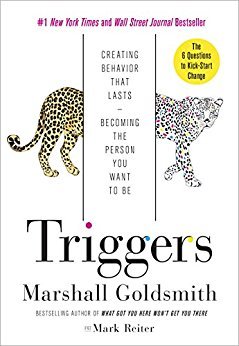More on this book
Community
Kindle Notes & Highlights
Read between
October 9 - October 14, 2020
A trigger is any stimulus that reshapes our thoughts and actions. In every waking hour we are being triggered by people, events, and circumstances that have the potential to change us.
Our environment is the most potent triggering mechanism in our lives—and not always for our benefit.
Fate is the hand of cards we’ve been dealt. Choice is how we play the hand.
Regret is the emotion we experience when we assess our present circumstances and reconsider how we got here. We replay what we actually did against what we should have done—and find ourselves wanting in some way. Regret can hurt.
Truth #1: Meaningful behavioral change is very hard to do.
Inertia is the reason we never start the process of change. It takes extraordinary effort to stop doing something in our comfort zone (because it’s painless or familiar or mildly pleasurable) in order to start something difficult that will be good for us in the long run.
our behavior is shaped, both positively and negatively, by our environment—and
Truth #2: No one can make us change unless we truly want to change.
Some people say they want to change, but they don’t really mean it.
Relying on other people increases the degree of difficulty exponentially.
An excuse is the handy explanation we offer when we disappoint other people.
An excuse explains why we fell short of expectations after the fact. Our inner beliefs trigger failure before it happens. They sabotage lasting change by canceling its possibility. We employ these beliefs as articles of faith to justify our inaction and then wish away the result. I call them belief triggers.
Just because people understand what to do doesn’t ensure that they will actually do it. This belief triggers confusion.
Our environment is a magnificent willpower-reduction machine.
few of us foresee the challenges we will face. As a result, the willpower we assume when we set a goal rarely measures up to the willpower we display in achieving that goal. Something always comes up to sink our boat. This belief triggers overconfidence.
Excusing our momentary lapses as an outlier event triggers a self-indulgent inconsistency—which is fatal for change.
We award ourselves a free pass because we’re not the worst in the world. This is our excuse to take it easy,
false sense of immunity.
We believe that we are above needing structure to help us on seemingly simple tasks.
three competing impulses: 1) our contempt for simplicity (only complexity is worthy of our attention); 2) our contempt for instruction and follow-up; and 3) our faith, however unfounded, that we can succeed all by ourselves.
unappealing exceptionalism
self-control is a limited resource. As we become tired our self-control begins to waver and may eventually disappear. The sheer effort of sticking with the plan triggers depletion.
This faith in time’s infinite patience triggers procrastination.
unrealistic expectations.
an epiphany experience triggers magical thinking.
It might produce change in the short run, but nothing meaningful or lasting—because
The Great Western Disease is “I’ll be happy when…” This is our belief that happiness is a static and finite goal,
a false sense of permanence.
Even when we get there, we cannot stay there without commitment and discipline.
as we usher an old problem out the door a new problem usually enters.
a fundamental misunderstanding of our future challenges.
1) there are no certainties that we’ll get what we want, 2) if the reward is the only motivator people revert to their old ways, and 3) all I’ve done is help a phony succeed.
Getting better is its own reward. If we do that, we can never feel cheated.
a dangerous preference for isolation.
when we revert to our previous behavior, people always notice.
We can change not only our behavior but how we define ourselves. When we put ourselves in a box marked “That’s not me,” we ensure that we’ll never get out of it.
We are notoriously inaccurate in assessing ourselves.
We think we are in sync with our environment, but actually it’s at war with us. We think we control our environment but in fact it controls us.
Our environment is a nonstop triggering mechanism whose impact on our behavior is too significant to be ignored.
(In some cases, I advise giving our environment a name.)
one tweak in the environment changes everything.
because we don’t appreciate how our environment influences our choice, we fail to make the right choice
Our environment isn’t static. It alters throughout our day. It’s a moving target, easy to miss.
If we do not create and control our environment, our environment creates and controls us. And the result turns us into someone we do not recognize.
When does he act like this? With whom? Why?
A feedback loop comprises four stages: evidence, relevance, consequence, and action.
our good behavior is not random. It’s logical. It follows a pattern.
trigger: A behavioral trigger is any stimulus that impacts our behavior.
Direct triggers are stimuli that immediately and obviously impact behavior, with no intermediate steps between the triggering event and your response.
Indirect triggers take a more circuitous route before influencing behavior.


